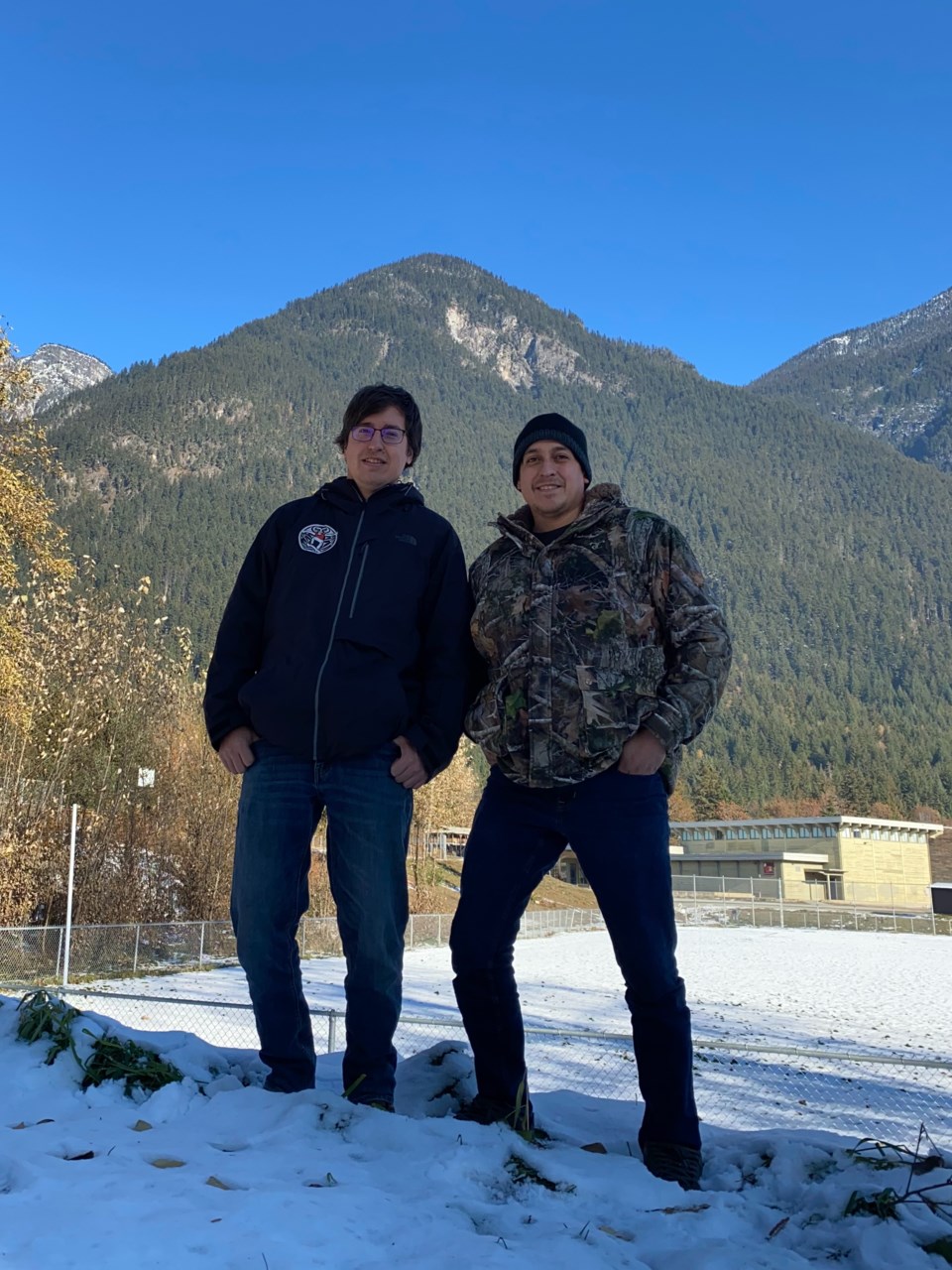The sun had long since set when Reuben Bikadi’s phone rang.
The call came in just after 9:30 p.m. on Oct. 23 from a neighbour, Adelaide Leo. A young member of the Mount Currie community had gone for a Sunday afternoon hike, but had gotten disoriented once the sky darkened. Could Reuben help find him?
He didn’t hesitate. The 35-year-old and his younger brother Logan Bikadi, 30, had received several similar calls before. The pair grew up hiking in mountains on Lil’wat Nation territory, and both spend much of their workdays navigating rough backcountry terrain—to say they know the area well would be a gross understatement.
“I didn’t think it was too serious at that time, so I jumped on my quad and said, ‘OK, I’ll go have a look,’” Reuben recalled. Based off the general location Leo provided, “I just assumed maybe he was right on the road or beside the road.”
Luckily, the hiker still had cell service. By 10:30, Reuben had found the hiker’s number and connected with him directly. “I asked him, ‘where are you exactly?’” The hiker told Reuben he travelled along a road to the highest possible point before continuing to climb a ridge, eventually hanging a slight left. There’s an “old ancestor trail” in the area, but no designated hiking paths, Reuben explained.
“He said there were rocks around him. And I thought right away, ‘like, oh my God, rocks mean you’re at the top of the mountain,’’ he said. “And the worst part of the mountain, actually, it’s cliffs with slides; very steep.”
Reuben beelined for his parents’ house to collect flashlights, batteries and, most importantly, his brother Logan. What followed was a nearly 12-hour ordeal that started with the brothers scaling 1,200 metres of elevation over two kilometres in just three hours, and ended on a longline dangling under a search-and-rescue (SAR) helicopter the next morning.
“I think we were walking for about 200 metres, if that, and then pretty well crawling the rest of the way up,” said Reuben. “It’s that steep.”
Throughout the trek, the Bikadis were able to stay in touch with the hiker through texts and phone calls, even adding him on Snapchat and using the app’s map feature to pinpoint their respective locations. Logan, a forestry field tech, also brought along contoured topographic maps charting the terrain’s steepness. The brothers consulted between the two, eventually making their way up a chute, over a cliff band—“that’s actually where we reached the snow, and it started snowing on us,” said Reuben—and through a dense thicket before seeing the hiker’s flashlight shining through and hearing him call out. It took the brothers just over three hours to reach him from the valley. “I’ve climbed that mountain in the past, but it took me six hours, not three,” said Reuben. “We cut that time in half.”
According to Environment Canada, temperatures on Oct. 23 reached a low of -2.5 degrees C in the Pemberton area, while Oct. 24 brought 9.8 millimetres of precipitation to the valley.
The brothers found the hiker, who they estimated to be about 20 years old, about 250 metres below the mountain’s summit, uninjured and armed with a spare phone battery and snacks but “completely hypothermic,” said Logan.
Added Reuben, “It got dark really fast on him. This was his explanation … he did try to come down the chute where we went up, which was, like, beyond dangerous—we even said, ‘we’re not coming back down this way.’”
The brothers pulled off the hiker’s wet gear, bundled him in Logan’s warm wool sweater, covered that up with his windbreaker and held the hiker close until his body temperature and breathing started to regulate. “I opened my coat up and I put him inside my coat, his head against my chest,” said Reuben. “I just held him there until he calmed down.”
Added Logan, “It took 20 minutes alone just to fix his breathing.”
Eventually, the three men scrambled their way downslope to a sheltered location under a cluster of trees near a clearing, digging into the steep terrain to carve out “a bed” for the hiker and a flat area to build a fire.
By that time, SAR crews had assembled in the valley and instructed the three men to stay put. A call had been put out for a night vision helicopter, said Reuben, but the chopper barely made it to Squamish before poor visibility forced it to turn back.
All three men were eventually airlifted out via longline and dropped off in a Mount Currie school field at 10:30 a.m., more than eight hours after first locating the hiker.
“When we got to the last, maybe, 100 feet off the ground, he looked at me and said ‘thank you,’” Reuben recalled. “I looked at him and said, ‘I told you I was going to get you off that mountain one way or another’ and he just broke right down.
“He couldn’t stop saying ‘thank you.’”
In a statement posted to the Lil’wat Nation’s official Facebook page, Chief Dean Nelson thanked the SAR teams and first responders who participated in the search, but recognized the Bikadi brothers in particular for “their selfless acts of community.”
The brothers, said Nelson, “took it upon themselves to make their way through the dark, steep and dangerous terrain” to find the missing community member. “Without Reuben and Logan’s selfless actions in this incident things would have been extremely dangerous with the winter weather moving in,” Nelson said.
Both brothers agreed it’s the “most major” rescue mission either have been a part of.
“But the way we were brought up, we just kind of knew what to do,” said Logan. “Everything fell into place.”




